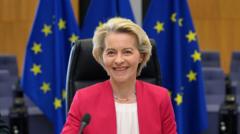A landmark decision emphasizes the importance of transparency in public health matters within the European Union.
Court Ruling Advances EU Transparency on Covid Vaccine Negotiations

Court Ruling Advances EU Transparency on Covid Vaccine Negotiations
EU judges mandate the disclosure of text messages between top officials and pharmaceutical executives.
In a significant ruling that may transform the landscape of transparency within the European Union, judges at the General Court in Luxembourg have stated that the European Commission must disclose text messages exchanged during the negotiation of Covid-19 vaccine contracts. This decision arose from a legal dispute initiated by The New York Times challenging the Commission's refusal to provide such key communications. The text messages in question were exchanged between Ursula von der Leyen, president of the European Commission, and Pfizer CEO Albert Bourla in 2021.
The case raised the critical legal issue of whether these text messages qualify as documents under EU law, warranting retention and disclosure. The European Commission's stance hinged on the notion that text messages are ephemeral communications and thus fall outside the purview of transparency obligations. However, the court rebuked this argument, asserting that the Commission had failed to adequately justify why these messages were not available, given their potential to contain vital information regarding the procurement process of Covid-19 vaccines.
The judges clarified that the Commission has an obligation not just to claim the absence of the requested documents, but to provide substantive reasoning behind their non-availability. In light of this ruling, the broader implications extend beyond this case, as it underscores the necessity for greater accountability and transparency from governmental bodies when engaging in significant public health negotiations. The case has positioned itself as a landmark moment for press freedom and the public's right to information across the European Union, a principle essential for democratic governance and public trust.
The case raised the critical legal issue of whether these text messages qualify as documents under EU law, warranting retention and disclosure. The European Commission's stance hinged on the notion that text messages are ephemeral communications and thus fall outside the purview of transparency obligations. However, the court rebuked this argument, asserting that the Commission had failed to adequately justify why these messages were not available, given their potential to contain vital information regarding the procurement process of Covid-19 vaccines.
The judges clarified that the Commission has an obligation not just to claim the absence of the requested documents, but to provide substantive reasoning behind their non-availability. In light of this ruling, the broader implications extend beyond this case, as it underscores the necessity for greater accountability and transparency from governmental bodies when engaging in significant public health negotiations. The case has positioned itself as a landmark moment for press freedom and the public's right to information across the European Union, a principle essential for democratic governance and public trust.





















